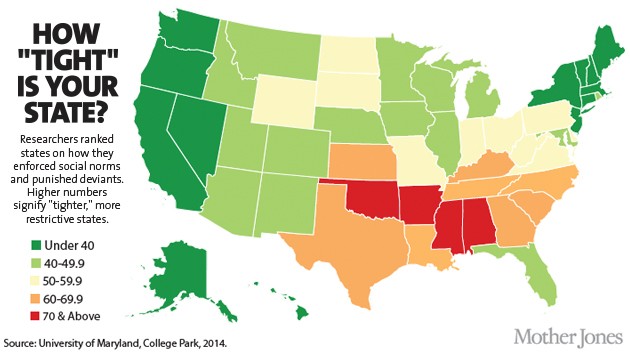
“And the day came when the risk to remain tight in a bud was more painful than the risk it took to blossom.” — Anais Nin
Two researchers at the University of Maryland just published a study in the journal Proceedings in the National Academy of Sciences. The study measured the states in the U.S. for “tightness” and “looseness.” Tight states, as defined by the study, have strong norms and little tolerance for deviance. Loose states have less definitive norms and a greater tolerance for deviance from them.
It probably wouldn’t surprise you to learn that Tennessee is one of the top 10 tightest states in the union. And Mississippi’s even tighter. Unsurprisingly, at least to me, the map of tight states and loose states is remarkably similar to the red state/blue state electoral map of recent presidential elections. The tightest states are all in the South, except for Kansas.
The researchers used a number of factors in determining a state’s degree of tightness, including: “the legality of corporal punishment in schools, the rate of executions from 1976 to 2011, the severity of punishment for violating laws, the ratio of dry to total counties per state, and the legality of same-sex civil unions. … The index also captures the strength of institutions that constrain behavior and enforce moral order, including state-level religiosity and the percentage of the total state population that is foreign, an indicator of diversity and cosmopolitanism.”
Tight states have a higher average of conscientiousness, lower impulsivity, greater self-control, orderliness, and conformity. Looser states have greater average openness, more nontraditional values and beliefs, and greater tolerance for difference and diversity. In other words, the South is Germany and the rest of the country is France. Jawohl, y’all!
Of course, within each state, the degrees of looseness and tightness vary. Louisiana is a very tight state, but few would argue that New Orleans isn’t loose. And I’d say here in Shelby County, it would be hard to dispute that Midtown and downtown are looser than, say, Bartlett.
So why is so much of the South so uptight? The researchers suggest that tight societies, here and around the globe, tend be those that face, or have faced, more threats, including natural disasters, wars, famine, etc. It’s inarguable that the U.S. got tighter after the 9/11 attacks, for example. So fear is possibly a factor in how tight we are. And, certainly, tornadoes can turn folks to religion in a hurry. But hurricane-prone Florida is a loose state, and Californians, who face earthquakes and wild fires, are looser than a bucket of marbles. I don’t think it’s the weather that makes us tight.
It’s the spectre of change, usually perceived as a threat to traditional values, that makes so many Southerners nervous. They see tightness as a virtue.
Me, I think it’s time we loosen up a little, mes amis.